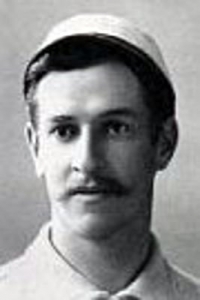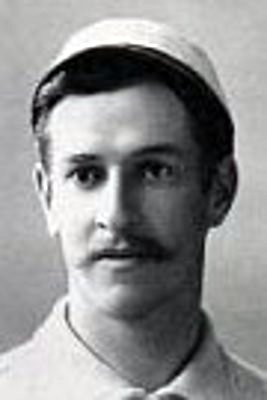August 17, 1891: Boston’s Kid Nichols one-hits the Giants
 With both clubs vying for the National League pennant lead and their respective staff aces scheduled for duty, the August 17 match between the Boston Beaneaters and the New York Giants shaped up to be an exciting, hard-fought contest. Monday-morning newspapers showed the 1891 season standings tightly bunched, with the Chicago White Stockings (56-39) clinging to a one-game lead over Boston (53-38) and New York (50-36) another half-game back. To get his club off on the right foot in the three-game series at the Polo Grounds, Beaneaters manager Frank Selee would lead with right-hander Charles “Kid” Nichols, a beardless youngster backing up the previous year’s 27-win rookie season with a standout sophomore campaign. New York, nominally managed by Jim Mutrie but actually led by captain-catcher Buck Ewing, would counter with burly fireballer Amos Rusie, another right-hander and arguably the circuit’s most intimidating hurler.
With both clubs vying for the National League pennant lead and their respective staff aces scheduled for duty, the August 17 match between the Boston Beaneaters and the New York Giants shaped up to be an exciting, hard-fought contest. Monday-morning newspapers showed the 1891 season standings tightly bunched, with the Chicago White Stockings (56-39) clinging to a one-game lead over Boston (53-38) and New York (50-36) another half-game back. To get his club off on the right foot in the three-game series at the Polo Grounds, Beaneaters manager Frank Selee would lead with right-hander Charles “Kid” Nichols, a beardless youngster backing up the previous year’s 27-win rookie season with a standout sophomore campaign. New York, nominally managed by Jim Mutrie but actually led by captain-catcher Buck Ewing, would counter with burly fireballer Amos Rusie, another right-hander and arguably the circuit’s most intimidating hurler.
As was their right, the homestanding Giants elected to bat first, and some of the 3,776 fans in attendance had barely settled into their seats when Nichols set the Giants down in order to begin the action. Rusie followed suit in the bottom of the first. The game’s pattern had now been established. Over the initial five innings, Rusie dominated Beaneaters batsmen, allowing only two hits while fanning eight. But Nichols was even better, matching Rusie strikeout-for-strikeout and holding the Giants hitless. Having shown his fastball early, Nichols began tantalizing New York hitters with off-the-plate breaking pitches. And much to the disgust of the local press corps, the Giants chased them. “They hit at balls continually several feet wide of the plate,” complained the New York Times,1 while a wire-service account of the game observed that “The Giants had the blind staggers and struck at balls which they could not have reached with a telephone pole.”2
After Nichols had posted his seventh straight hitless inning, a scoreless deadlock was broken in the Boston half of the frame. Rusie contributed to his own eventual downfall by walking leadoff batter Billy Nash. Steve Brodie then legged out a slow roller to short. With two on and no outs, Tommy Tucker sent a bounder to the right of Giants first baseman Roger Connor, who knocked the ball down and then tossed it to Rusie covering first as Tucker sped for the bag. A close call by lone umpire Tim Hurst went in Boston’s favor, loading the bases.3 The game outcome turned on a hot shot hit by Joe Quinn that went between Connor’s legs into right field. Two runs scored on the error while Tucker took third. He then scored the inning’s final tally on a sacrifice bunt by catcher Charlie Bennett.
Suddenly down three runs, New York attempted to rally. But all the Giants could manage was breaking up Nichols’ no-hit bid. An eighth-inning single “of scratch order”4 by Connor spared New York that indignity. Otherwise, Nichols’ pitching had been flawless. In the course of a 3-0 one-hitter in which no Giants baserunner got as far as second base, he had struck out nine or 10 enemy batters, while walking none.5 In the eyes of the Boston press, Kid had “pitched a phenomenal game,”6 while even the partisan New York Herald acknowledged that Nichols had staged “a magnificent exhibition of box work.”7
The umpire, Tim Hurst, was officiating in the first year of a 16-year major-league career. The game was completed in 1 hour and 33 minutes, according to the box score published in the next day’s Boston Globe. One oddity of the game: Boston shortstop Herman Long and left fielder Bobby Lowe each played the game for Boston wearing Giants uniforms. The Globe reported, “Their baggage had not been delivered at their hotel before they left, and they had to borrow odds and ends.”8
The clubs split the remaining two games of the series but were soon headed in opposite directions. Notwithstanding a yeoman’s effort by Amos Rusie (33-20 and 500⅓ innings pitched), the Giants faded to a distant third-place finish, 13 games out. Meanwhile, Boston, behind the pitching of 30-game winner Kid Nichols, overtook Chicago for the first of three consecutive National League titles.
For Nichols, it was also the first of seven seasons in which he won 30 or more games; in 1949 he was named to the National Baseball Hall of Fame. Rusie, too, was inducted into the Hall of Fame, in 1977.
Notes
1 New York Times, August 18, 1891. The New York Tribune lamented that “Nichols was throwing to men whose common sense seemed to have been left at home, and whose ‘lamps’ needed burnishing.”
2 See, e.g., the Cleveland Plain Dealer, August 18, 1891.
3 The scoring decision on the play was not uniform. Next-day box scores published in the Boston Daily Advertiser, Boston Journal, and New York Herald credited Tucker with a base hit [as did the box score in Sporting Life, August 22, 1891]. Boxes in the Cleveland Plain Dealer, New York Times, New York Tribune, and Washington Post charged Connor with an error, as did The Sporting News, August 22, 1891
4 New York Times, August 18, 1891.
5 The box scores published in the Boston Daily Advertiser, Boston Globe, New York Herald, and Sporting Life all showed nine strikeouts, while those published in the Boston Journal, Cleveland Plain Dealer, New York Times, New York Tribune, The Sporting News, and Washington Post all showed 10.
6 Boston Daily Advertiser, August 18, 1891.
7 New York Herald, August 18, 1891.
8 “With a Solitary Hit,” Boston Globe, August 18, 1891: 5.
Additional Stats
Boston Beaneaters 3
New York Giants 0
Polo Grounds
New York, NY
Corrections? Additions?
If you can help us improve this game story, contact us.


